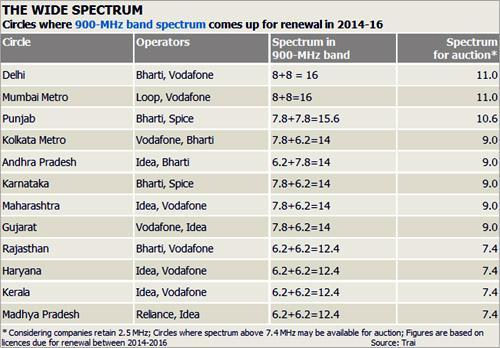 | « Back to article | Print this article |
 When incumbent operators go for renewal of their 20-year licences between 2014 and 2016, the government will be able to auction 9-11 MHz of the 900-MHz band spectrum, available after refarming, in eight of the country's 22 key telecom circles.
When incumbent operators go for renewal of their 20-year licences between 2014 and 2016, the government will be able to auction 9-11 MHz of the 900-MHz band spectrum, available after refarming, in eight of the country's 22 key telecom circles.
The circles that can be covered include Delhi, Mumbai, Maharashtra, Gujarat, Andhra Pradesh and Karnataka.
In four other circles - Madhya Pradesh, Kerala, Haryana and Rajasthan - spectrum up to 7.2 MHz will be available for auctioning.
The empowered group of ministers (EGoM) on telecom had decided yesterday that incumbent operators would be allowed to retain up to 2.5 MHz of spectrum in the 900-MHz band and the rest would be refarmed to the 1,800-MHz band. But, the operators would have to pay the auction-discovered price.
After refarming, over 142.5 MHz of spectrum is expected to be available for auctioning next year. Vodafone is going to be the worst hit in the first phase of refarming, as licences for 10 circles, in which it has 68.8 MHz spectrum in the 900-MHz band, will come up for renewal during this period (2014-2016).
Following Vodafone among the worst affected will be Bharti, with licences for eight of the 12 circles, in which it has spectrum in the 900-MHz band, coming up for renewal.
Next would be Idea Cellular (with seven of its nine circles) and Reliance Communications (with six of its seven circles). As much as half of the 431.8 MHz of spectrum available in the 900-MHz band is to come for renewal next year, and part of it will come for auction.
Data suggest, another big chunk of spectrum in the 900-MHz band will be available when licences for BSNL's 18 circles will come for renewal in 2020. Then, another 68.4 MHz of spectrum in that band would be available for other operators.
On the other hand, in what could be a piece of good news for operators in Mumbai and Delhi circles, MTNL's 900-MHz spectrum will come up for renewal in 2017, providing an additional 3.7 MHz of spectrum in that band for existing operators.
The Telecom Regulatory Authority of India (Trai) had initiated the refarming exercise two year ago, saying the valuable 900-MHz spectrum, given out to incumbent operators in the first phase of auction in 1994 for 2G services, was best suited for services like 3G.
Trai has said space needs to be created for a new operator. But, providing for a new operator using the spectrum for 3G operations would require reserving 5 MHz which could be difficult.
The COAI director general says: "If 5 MHz spectrum is reserved for a new operator, all GSM operators will have to give back the 2.5 MHz they have been allowed to retain and bid as new operators."
Mohammad Chowdhury, leader (telecom), PricewaterhouseCoopers India, said: "Existing operators in key circles like Mumbai, Delhi and Kolkata are likely to go for competitive bidding, as they would try to have as much spectrum as possible to retain their positions in these markets. New entrants would mainly bid for Circle B and C, and are unlikely to go for aggressive bidding in key circles."